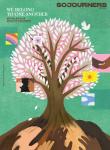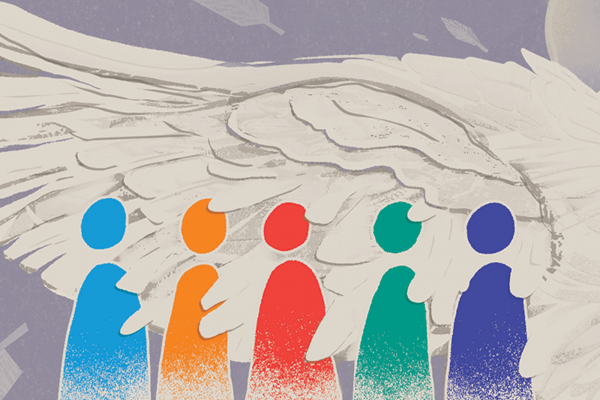TO WHOM DO our lives belong? The Barmen Declaration, written in 1934, was a theological statement by a small group of German Protestants in response to the growing pro-Nazi movement within German Christianity. It stated, “We reject the false doctrine, as though there were areas of our life in which we would not belong to Jesus Christ, but to other lords—areas in which we would not need justification and sanctification through him.” The signers of the Barmen statement said this because the confederation of German Protestant churches (which would eventually become the state church under the Nazi Third Reich) was demanding allegiance to the state in all areas of life and faith. The close of Eastertide gives us an opportunity to consider, in our own time and place, to whom we belong and what that means for how we live now amid echoes of authoritarianism.
In this season, we read of Jesus’ growing influence and what it meant for his disciples to reckon with a world in which resurrection is possible. If the threat of death is muted, if not even prison can contain the good news, then how emboldened will a small-but-mighty movement become in the face of a powerful empire and its proxies? Can this good news still reach us—we who are worn from the immense grief of the last two years? Can we find our second wind to share this good news and build God’s reign? I believe Eastertide has a particular resonance for these times.
May 1
Hear, My People
Acts 9:1-20; Psalm 30; Revelation 5:11-14; John 21:1-19
THE TEXTS FOR THE THIRD SUNDAY of Easter invite us to consider the claims we and God make concerning each other. Acts 9 tells the story of Saul’s dramatic conversion and Ananias’ internal struggle about ministering to a notorious enemy of the church. Jesus had specific intentions for Saul, but those intentions needed to be catalyzed by the cooperation of both Saul and Ananias. Could Saul transform a lifetime of socialization? Was Ananias willing to not only face someone who had menaced his community but also bless him? This is a crisis of conviction for both.
In John’s gospel, Jesus appears to the male disciples for the third time after his resurrection. On the shore of Galilee, Jesus cooks breakfast and says to Simon Peter, “Simon, son of John, do you love me more than these?” (21:15). “Simon” is a Hellenization of the Hebrew word shimon, meaning “one who hears.” It’s the root of the Jewish prayer Shema Yisrael: “Hear, O Israel: The Lord is our God, the Lord alone. You shall love the Lord your God with all your heart, and with all your soul, and with all your might” (Deuteronomy 6:4-5). Jesus asks Simon Peter, “Do you love me?” three times. Does Peter hear? Earlier, Peter had denied knowing Jesus three times, to escape getting lynched alongside him. With each inquiry, Jesus gives Simon Peter an opportunity to retract his rejections. Not only can Simon Peter offer a retraction, but he can put his love into service: “Feed my lambs ... Tend my sheep ... Feed my sheep” (John 21:15-17).
May 8
Becoming Sheepish
Acts 9:36-43; Psalm 23; Revelation 7:9-17; John 10:22-30
ON A “GOOD SHEPHERD Sunday” some years ago, I was the guest preacher at a local church. A parishioner shared with me a fascinating fact about sheep: Every day they’ll approach their shepherd to be touched on the nose. This is the sheep’s way of acknowledging their shepherd and an opportunity for the shepherd to acknowledge them in return. No one ever tells sheep to do this. They do it instinctually.
In John’s gospel, Jesus teaches that his sheep know to acknowledge their Shepherd by how they live (10:27). One lives into being a sheep. And an intimacy develops between sheep and Shepherd that simply cannot be counterfeited. That’s what the disciple Tabitha responds to when she hears Peter call her name, an act that raises her to life (Acts 9:40).
Tabitha’s resurrection in Acts serves as evidence of the “eternal life” (John 10:28) promised by the Shepherd. Psalm 23 expresses trust in this powerful care but recognizes the “valley of the shadow” and the presence of “enemies.” John’s eschatological vision of those who’ve overcome “the great ordeal” casts a vision of the Lamb overcoming violence and death (Revelation 7:14). There is an ever-present danger in these passages, even while under the Shepherd’s care. Our right living does not shield us from threat. Will that danger change us? Will it make us callous and hopeless? Or will we remain steadfast in our commitment to be sheep who entrust their care to the Shepherd?
May 15
Kingdom of Love
Acts 11:1-18; Psalm 148; Revelation 21:1-6; John 13:31-35
WHY DOES JESUS say he’s giving a “new commandment, that you love one another” (John 13:34)? The commandment to love is not new, so what is “new” about Jesus’ mandate before he goes to the cross? Building upon the primary and secondary commandments, Jesus undergirds them with a new standard. Jesus instructs the disciples to love each other as he has loved them—and will love them. This love will require the disciples not only to love God with “all your heart and with all your soul and with all your might” (Deuteronomy 6:5) and to “love your neighbor as yourself” (see Leviticus 19:18), but to lay down their lives for one another. Jesus has shown such love for them in his life and will show an even greater love as he goes to his death for them.
In Acts 11, Peter’s defense of his engagement with the Gentiles, who are uncircumcised and thus “unclean,” also reveals God’s hand in something that appears new to this community. John’s eschatological vision shows the expanse of God’s reign, where there is a “new heaven and a new earth” and God dwells among humanity. In Psalm 148, praise of God emanates from beyond Earth (even the sun, moon, and stars offer praise), for God’s influence is found there as well. Because God’s reach is expansive, our praise of God must also be expansive.
May 22
No Strings Attached
Acts 16:9-15; Psalm 67; Revelation 21:10,22 - 22:5; John 5:1-9
IN THE WHOLE of scripture, God has no marionettes. There are no puppets on strings and no mindless androids with encoded instructions or remote controls. God labors alongside God’s people. God works with folks, such as Moses, who have troubled pasts and deep insecurities. God welcomes the participation of a young, betrothed woman who hears a prophecy and embraces it. In the work of salvation, justice, and wholeness, God has always enlisted partners.
This partnership is on display in John 5 as Jesus enlists the sick man at the pool of Beth-zatha to participate in his own healing. He is not doing for the man; he’s doing the work with him. We see it again in the story of Lydia’s conversion (Acts 16). First, we hear of the Holy Spirit contributing to Paul, Silas, and Timothy in their work and travels. Then the Lord opens Lydia’s heart to the words of Paul. All are collaborative works of love. The community of believers is growing through the faithfulness of God and cooperation of humans. God and people have mutual responsibilities to each other.
In the last 30 years, disability justice movements have organized around the phrase “Nothing about us without us.” This is God’s posture—power with rather than power over. The church is poised to become something deeper than a charitable enterprise. We are empowered to nourish resilient community and shift the world’s trajectory toward responsible partnership.
May 29
Guide and Critic
Acts 16:16-34; Psalm 97; Revelation 22:12-21; John 17:20-26
THE END OF Eastertide always feels a little like Advent to me. There’s a communal longing and anticipation for God to step into the human condition. Instead, we commemorate Jesus’ ascension into the heavens—and now we are waiting, again. But this Sunday we rewind a bit in the story to the scene before Jesus’ arrest. Jesus prays and casts a vision for his disciples and for us, for a church that is one with God and with each other in ways that transcend our myriad differences.
In truth, this vision still awaits its time. The fractured American church hardly resembles the church of Jesus’ dying wish. The Roman Empire scattered Jesus’ disciples once he was no longer with them, so the disciples needed something stronger than empire to hold them together. In parts of the religious landscape in the U.S., church and state are indistinguishable. On the first anniversary of the Jan. 6 attack on the Capitol, NPR correspondent John Burnett unpacked the Patriot Church movement, examining how Christian nationalism thrives in the U.S. with its insistence that the United States is a “Christian nation.” I call to mind the Barmen Declaration and Martin Luther King Jr.’s prophetic reminder that the church “must be the guide and the critic of the state—never its tool.”

Got something to say about what you're reading? We value your feedback!

